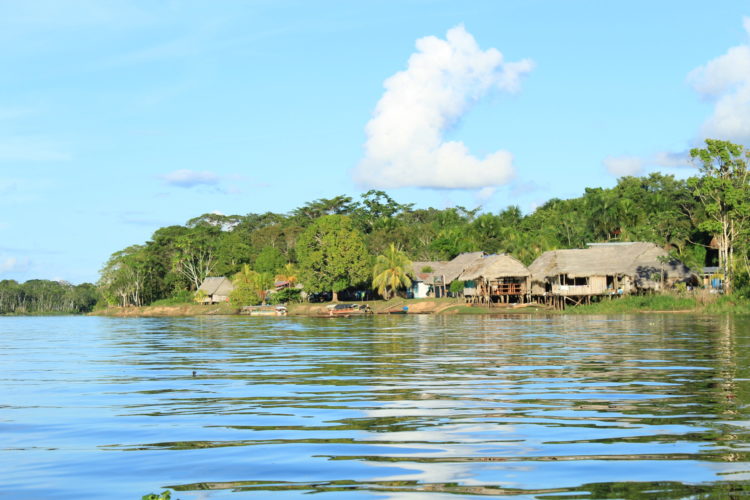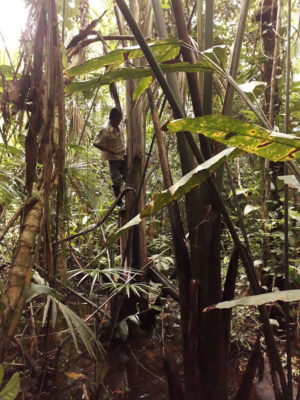Saving tropical peatlands could protect humans from future pandemic outbreaks

Conservation of tropical peatlands could reduce the impacts of the Covid-19 pandemic and the likelihood of new diseases jumping from animals to humans, according to new research involving the University of St Andrews.
Destruction of these areas risks bringing animals such as bats, rodents and primates in contact with greater numbers of human beings and passing on zoonotic diseases which can have a devastating impact on humanity according to the paper published in PeerJ.
An international research team led by Exeter University included the University of St Andrews and researchers from countries with large tropical peatlands, including Indonesia, the Democratic Republic of Congo and Perú.
Covid-19 did not emerge in a tropical peatland area, but the scientists reviewed existing evidence and concluded that the high biodiversity in tropical peat-swamp forests, combined with habitat destruction and wildlife harvesting, created “suitable conditions” for emerging infectious diseases (EIDs) that could jump to humans.
Dr Katherine Roucoux of the School of Geography and Sustainable Development at the University of St Andrews said: “The Covid-19 pandemic has had a large impact on the communities that we work with in the Peruvian Amazon, and we hope that this article will draw attention to the challenges they are facing and the need to protect these globally important tropical ecosystems into the future.”
Dr Lydia Cole, a co-author working with Dr Roucoux within the Peatlands at St Andrews (P@StA) research group, added: “Working with this team of co-authors has given us a great opportunity to gather expertise and information on peatland ecosystems from across the tropics and apply it to a very pressing contemporary issue that affects us all.”
Lead author Dr Mark Harrison of the Centre for Ecology and Conservation at the University of Exeter said: “We’re not saying tropical peatlands are unique in this respect, but they are one important habitat where zoonotic diseases (those that jump from animals to humans) could emerge.
“Tropical peat-swamp forests are rich in fauna and flora, including numerous vertebrates known to represent zoonotic EID risk, such as bats, rodents, pangolins and primates.
“Exploitation and fragmentation of these habitats, as well as peat wildfires (ultimately driven by human activity) and wildlife harvesting, bring more and more people into close contact with peatland biodiversity, increasing the potential for zoonotic disease transmission.
“Our review shows that protecting tropical peatlands isn’t therefore just about wildlife and carbon emissions – it’s also important for human health.”
 The study also notes “high impacts” of Covid-19 in some countries with large tropical peatland areas, some of which are relatively poorly resourced to tackle pandemics.
The study also notes “high impacts” of Covid-19 in some countries with large tropical peatland areas, some of which are relatively poorly resourced to tackle pandemics.
Dr Ifo Suspense, of Université Marien, Republic of Congo, who contributed to the review, said: “Many communities in these areas are remote, relatively poor, disconnected, have limited infrastructure, sub-standard or non-existent medical facilities, and depend heavily on external trade.
“As a result, the direct and indirect impacts of Covid-19 may be particularly severe in these communities.”
Dr Muhammad Ali Imron, from University Gadjah Mada in Indonesia, who was also involved in the study, said: “Additionally, major wildfires in peatland areas cause massive air pollution, particularly in South East Asia, increasing the threat to human health from respiratory diseases like Covid-19.
“In terms of the impacts on peatlands themselves, we reveal that conservation, research and training are all being affected by the pandemic, which may result in increased habitat encroachment, wildlife harvesting and fires started to clear vegetation.”
Dr Euridice Honorio, Instituto de Investigaciónes de la Amazonía Peruana (IIAP), added: “Large areas of forested peatlands still occur in Peruvian Amazonia and can support the development of innovative approaches (e.g., carbon/REDD projects) for their long-term conservation.”
The study concludes: “Sustainable management of tropical peatlands and their wildlife is important for mitigating impacts of the Covid-19 pandemic and reducing the potential for future zoonotic EID emergence and severity, thus strengthening arguments for their conservation and restoration.”
To help achieve this, the study identifies a number of opportunities and recommendations for researchers, field projects, policy makers and donors to help achieve this goal.
Caption for images: a remote tropical peatland community in Buenos Aires, within the Pacaya Samiria National Reserve, Peruvian Amazon, which is accessible only by boat. People living here and in neighbouring communities rely heavily on resources extracted from the surrounding peat-forming Mauritia flexuosa palm swamps. Photo credit: Lydia Cole.
The paper, ‘Tropical peatlands and their conservation are important in the context of COVID-19 and potential future (zoonotic) disease pandemics’ by Harrison ME, Wijedasa LS, Cole LES, Cheyne SM, Choiruzzad SAB, Chua L, Dargie GC, Ewango CEN, HonorioCoronado EN, Ifo SA, Imron MA, Kopansky D, Lestarisa T, O’Reilly PJ, Van Offelen J, Refisch J, Roucoux K, Sugardjito J, Thornton SA, Upton C, Page Sis published in PeerJ 8:e10283 and available online.
Please ensure that the paper’s DOI [peerj.com/articles/10283/] is included in all online stories and social media posts and that Nature Energy is credited as the source.
Issued by the University of St Andrews Communications Office.